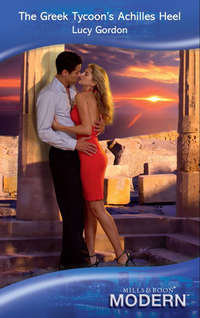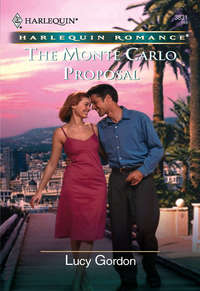
Полная версия
And the Bride Wore Red

And The Bride Wore Red
Lucy Gordon

www.millsandboon.co.uk
Table of Contents
Cover Page
Title Page
Dear Reader
About the Author
Chapter One
Chapter Two
Chapter Three
Chapter Four
Chapter Five
Chapter Six
Chapter Seven
Chapter Eight
Chapter Nine
Chapter Ten
Chapter Eleven
Chapter Twelve
Copyright
Dear Reader
A couple of years ago I visited China, and was overwhelmed by its beauty, its magnificence and above all its mystery. In Beijing I saw the Forbidden City, where the Emperors lived and where their concubines had their apartments. Later I visited the Terracotta Warriors. I’d heard so much about them, but nothing could have prepared me for their breathtaking, lifelike reality.
After that came a cruise along the Yangtze River, marvelling at the high banks that rise on each side, giving the feeling of being enclosed in a separate world. It could be a perfect place for lovers, as my hero and heroine Lang and Olivia discovered. But at last the outside world intruded, facing them with decisions that threatened to tear them apart.
When they finally found their destiny it was because they were true to themselves, and also because they had answered the magical call of China. It was a call that would always draw them back—just as it has drawn me back, and will do again.
Warm wishes
Lucy Gordon
Lucy Gordon cut her writing teeth on magazine journalism, interviewing many of the world’s most interesting men, including Warren Beatty, Charlton Heston and Roger Moore. She also camped out with lions in Africa, and had many other unusual experiences which have often provided the background for her books. Several years ago, while staying in Venice, she met a Venetian who proposed in two days. They have been married ever since. Naturally this has affected her writing, where romantic Italian men tend to feature strongly.
Two of her books have won the Romance Writers of America RITA® award: SONG OF THE LORELEI in 1990, and HIS BROTHER’S CHILD in 1998, in the Best Traditional Romance category.
You can visit her website at www.lucy-gordon.com
Chapter One
‘OLIVIA, come quickly! There’s been a terrible disaster!’
Olivia looked up from the school books she was marking to where Helma, the young teaching assistant, stood in the doorway. She was only mildly alarmed by the girl’s agitated words. Helma had a wild sense of drama and ‘a terrible disaster’ might mean no more than the school cat making off with someone’s lunch.
‘It’s Yen Dong!’ Helma wailed.
Ten-year-old Dong was the brightest pupil in Olivia’s class at the Chang-Ming School in Beijing. He was also the most mischievous, using his impish charm to evade retribution for his many escapades.
‘What’s he done now?’ Olivia asked. ‘Set a booby trap for the headmistress?’
‘He’s climbed a tree.’
‘Again? Then he can just come down. It’s almost time for afternoon lessons.’
‘But he’s ever so high and I don’t think he can get down.’
Olivia hurried out into the garden that formed the school’s playground and looked up. Sure enough, there was the little rascal, high on the tallest tree, looking cheerful even while hanging on for dear life.
‘Can you climb down?’ Olivia called.
He ventured a step, but his foot slid on the next branch and he backed off hastily.
‘All right, not to worry,’ Olivia said, trying to sound more confident than she felt. ‘I need a ladder.’
One was fetched immediately, but to everyone’s dismay it fell short of Dong by several feet.
‘No problem,’ Olivia sang out, setting her foot on the bottom rung.
Luckily she was wearing jeans, which made climbing easier, and reaching the top of the ladder wasn’t too hard. But the next bit didn’t look so easy. Taking a deep breath, she set her foot on a branch. It trembled but held, and she was emboldened to haul herself up. In another moment she had reached Dong, who gave her a beaming smile.
‘It is very nice up here,’ he said in careful, perfect English. ‘I like climbing trees.’
Olivia looked at him askance. At any other time she would have been delighted with his command of her language. In the six months she’d spent teaching English at the Chang-Ming School, she’d found that Dong was the one who grasped everything first. She was proud of him, but right now she had other things to worry about.
‘I like climbing trees too,’ she said. ‘But I also like getting down safely. So let’s try to do that.’
She began to edge down, encouraging him to follow her so that he descended into the safety of her arms. One branch, then two, then three and finally, to her immense relief, the top rung of the ladder.
‘Just a little further,’ she said. ‘Nearly there.’
But it was the ladder which failed them, sliding away from the tree suddenly and depositing them on the ground with a bump.
Olivia gasped as she felt the bark scrape painfully against her arm, but her real fear was for Dong.
‘Are you hurt?’ she asked worriedly.
He shook his head, refusing to be troubled by a few bruises, and bounced back onto his feet.
‘I am well,’ he pronounced.
Clearly this was true, but Olivia knew she had to be sure.
‘I’m getting you to a doctor,’ she said.
The headmistress had arrived on the scene in time to hear this. She was in her late forties with an air of common sense.
‘That’s a good idea,’ she said. ‘He seems fine, but let’s take no chances. There’s a hospital ten minutes away. I’ll call a taxi.’
A few minutes later they were on their way to the hospital. Olivia kept an anxious eye on Dong, but he was grinning, completely happy with the result of his escapade.
In the hospital someone showed them the way to the clinic, and they joined a short queue. A nurse gave Olivia some forms, and she filled them in while they waited to be seen.
A notice on the wall informed her that today’s clinic was being taken by Dr Lang Mitchell. Briefly she wondered about that name; ‘Mitchell’ suggested that he might come from the West, but ‘Lang’ held a hint of Chinese.
After a few minutes the buzzer announced that the doctor was free, and they went in. Olivia saw a tall young man in his early thirties, with dark hair and eyes, and good-looking features that were mostly Western, yet with an intriguing hint of something else.
‘What have you two been doing to yourselves?’ he demanded, smiling and eyeing the state they were in.
‘Miss Daley climbed a tree,’ Dong said irrepressibly, ‘and I went up to help her when she got stuck.’
Olivia looked aghast, which made Dr Mitchell grin in perfect comprehension.
‘Perhaps it was the other way around?’ he suggested.
‘It certainly was,’ Olivia declared, recovering her dignity. ‘On the way down the ladder slipped, and we landed in a heap.’
He studied the forms. ‘You are Miss Olivia Daley, a teacher at the Chang-Ming School?’
‘That’s right. Yen Dong is one of my pupils. I don’t think he’s hurt, but I have to be sure when I hand him back to his mother.’
‘Of course. Let’s have a look.’
After a thorough examination of Dong, he said, ‘I agree that it doesn’t look serious, but we’ll have an X-ray just to be on the safe side. The nurse will take him.’
‘Perhaps I should go too.’
But Dong shook his head, informing her that he was grown up and didn’t need to be protected all the time. When he’d left with the nurse, the doctor switched to English to say, ‘Let’s see about your injuries.’
‘Thank you. But I really don’t need much done.’
Smiling, he said gently, ‘Why don’t you let me decide that?’
‘Sorry,’ she groaned. ‘I just can’t help it. My aunt says if I’d shut up occasionally I might learn something.’
He smiled again but didn’t answer directly. Then he frowned, saying, ‘It might be worse than you think.’
Now she saw the true extent of the damage. The final slide against the bark of the tree had not merely scratched her flesh but torn the top of her sleeve so that it was barely hanging on.
‘I’m afraid I’ll need to remove your blouse,’ Dr Mitchell said. ‘The scratches seem to go further than your arm. Don’t worry, a nurse will be present.’
He went to the door and called, ‘Nurse.’ A smiling young woman entered, removed Olivia’s blouse gently and remained while he studied her abrasions. He eased her arm this way and that with movements that were as neat as they were skilful. His hands were large and comforting, both gentle and powerful together.
Disconcertingly she found herself becoming self-conscious. The blouse was high-necked and modest, even severe, as befitted a teacher, but beneath it she wore only a bra of fairly skimpy dimensions. She had breasts to be proud of, an unusual combination of dainty and luscious. Every bra she possessed had been designed to reveal them to one man, and although he was no longer part of her life she had never discarded them.
It had briefly crossed her mind to substitute underwear that was more sober and serious, but she’d rejected the thought as a kind of sacrilege. Now she wished she’d heeded it. Her generous curves were designed to be celebrated by a lover, not viewed clinically by a man who seemed not to notice that they were beautiful.
But that was as it should be, she reminded herself. The doctor was being splendidly professional, and deserved her respect for the scrupulous way he avoided touching her except when and where necessary. It was just disturbing that his restraint seemed to bring her physically alive in a way that only one man’s touch had before.
He was cleaning her arm, swabbing it gently with cotton wool anointed with a healing spirit.
‘This will sting a little,’ he said. ‘I’m sorry, are you all right?’
‘Yes, I—’
‘You jumped. I guess it stings more than I thought. Don’t worry, I’ll soon be finished.’
To her own dismay she’d sounded breathless. She hoped he didn’t guess the reason, or notice the little pulse beating in her throat.
‘Your diagnosis was quite correct,’ he said after a while. ‘Just a light dressing, I think. Nurse?’
The nurse did the necessary work, then helped Olivia back on with her ruined blouse and departed. Dr Mitchell had retired behind his desk.
‘How are you going to get home?’ he asked, eyeing the tear.
‘I look a bit disreputable, don’t I?’ she said with a laugh. ‘But I’ve got this.’ She took a light scarf from her bag and draped it over the spot. ‘And I’ll take a taxi. Just as soon as I know that Dong is all right.’
‘Don’t worry about him. I never saw such a healthy child.’
‘I know,’ she said with a shaky laugh. ‘He’s a rascal, I’m glad to say. No power on earth stops him getting up to mischief. He couldn’t see the highest tree in the playground without wanting to climb it.’
‘And that can be good,’ Dr Mitchell said. ‘Except that other people have to pick up the pieces, and often it is they who get hurt. I was much the same as a boy, and always in trouble for it. But I only recall my teachers reproving me, not risking their own safety to rescue me.’
‘If he’d been seriously hurt, how could I have faced his mother?’
‘But he isn’t seriously hurt, because he had a soft landing on top of you.’
‘Something like that,’ she said ruefully. ‘But nothing hurts me. I just bounce. And I should be getting him back to school soon, or he’ll be late going home.’
‘What about when you go home?’ he asked. ‘Is there anyone there to look after you?’
‘No, I live alone, but I don’t need anyone to look after me.’
He paused a moment before saying, ‘Perhaps you shouldn’t be too confident of that.’
‘Why not?’
‘It—can sometimes be dangerous.’
She wanted to ask him what he meant. The air was singing as though two conversations were happening together. Beneath the conventional words, he was speaking silently to a part of her that had never listened before, and it was vital to know more. She drew a breath, carefully framing a question…
‘Here I am,’ came a cheerful voice.
Suddenly she was back on earth, and there was Dong, trotting into the room, accompanied by the nurse with the X-ray.
‘Excellent,’ Dr Mitchell said in a voice that didn’t sound quite natural to Olivia’s ears. But nothing was natural any more.
As predicted, the X-ray showed no injury.
‘Bring him back if he seems poorly,’ Dr Mitchell told her, his tone normal again. ‘But he won’t.’
He showed her out and stood watching as she vanished down the corridor and around the corner. Closing the door, he reached automatically for the buzzer, but stopped. He needed a moment to think before he saw another patient.
He went to stand at the window. Here, two floors high, there was a close-up view of the trees hung with cherry blossom; the promise of spring had been gloriously kept, and still lingered.
Here in China cherry blossom was a symbol of feminine beauty; seemingly delicate, yet laden with hope and promise. Now he saw that wherever he looked it was the same, as fresh new life returned after the cold, bringing hope and joy for those who were eager to embrace it.
On the surface nothing very much had happened. Olivia Daley was strong, independent, concerned not for herself but those in her care, much like the kind of woman a medical man met every day. It might only have been his imagination that beneath her composure was someone else—someone tense, vulnerable, needing help yet defiantly refusing to ask for it.
He could hear her again, insisting, Nothing hurts me. I just bounce.
He wondered if she truly believed herself so armoured to life. For himself, he didn’t believe a word of it.
A few minutes they’d been together, that was all. Yet he’d seen deep into her, and the sad emptiness he’d found there had almost overwhelmed him. He knew too that she’d been as disconcertingly alive to him as he had been to her.
He’d smothered the thought as unprofessional, but now it demanded his attention, and he yielded. She was different from other women. He had yet to discover exactly how different, and caution warned him not to try. Already he knew that he was going to ignore caution and follow the light that had mysteriously appeared on the road ahead.
It was a soft light, flickering and uncertain, promising everything and nothing. But he could no more deny it than he could deny his own self.
‘Is everything all right?’ asked the nurse from the doorway. ‘You haven’t buzzed.’
‘I’m sorry,’ he said with an effort. ‘I just—got distracted.’
She smiled, following his gaze to the blossomladen trees. ‘The spring is beautiful, isn’t it?’
‘Yes,’ he murmured. ‘Beautiful.’
They arrived back at the school to find Mrs Yen, Dong’s mother, waiting with a worried look that cleared as soon as she saw him waving eagerly.
‘Perhaps you should take tomorrow off?’ Mrs Wu, the headmistress, asked when they were finally alone.
‘Thanks, but I won’t need to.’
‘Well, be sure. I don’t want to lose one of my best teachers.’
They had been friends since the day Olivia had joined the school, charged with instructing the children in English. Now Mrs Wu fussed over her kindly until she went to collect her bicycle and rode it to her apartment, ten minutes away.
She had moved in six months ago, when she’d arrived to work in Beijing. Then she had been distraught, fleeing England, desperately glad to be embraced by a different culture which occupied her thoughts and gave her no time to brood. Now her surroundings and her new life were more familiar, but there were still new discoveries to be made, and she enjoyed every day.
She had a settled routine for when she arrived home. After a large cup of tea, she would switch on the computer and enter a programme that allowed her to make video contact with Aunt Norah, the elderly relative in England to whom she felt closest.
London was eight hours behind Beijing, which meant that back there it was the early hours of the morning, but she knew Norah would be ready, having set her alarm to be sure.
Yes, there she was, sitting up in bed, smiling and waving at the camera on top of her computer screen. Olivia waved back.
Norah was an old lady, a great-aunt rather than an aunt, but her eyes were as bright as they’d been her youth, and her vitality was undimmed. Olivia had always been close to her, turning to her wisdom and kindness as a refuge from the selfcentred antics of the rest of her family.
‘Sorry I’m late,’ she said into the microphone. ‘There was a bit of a kerfuffle at school today.’
She outlined the events of the afternoon, making light of them.
‘And the doctor said you were all right?’
‘He says I’m fine. I’ll have an early night and be fit as a fiddle.’
‘Are you going out with anyone?’
‘You asked me that last night, and the night before. Honestly, Auntie, it’s all you ever think of.’
‘So I should hope. You’re a pretty girl. You ought to be having a good time.’
‘I’m having a wonderful time. And I do have dates. I just don’t want to get serious. Now, tell me about yourself. Are you getting enough sleep?’
There was more in the query than just a desire to change the subject. Norah was in her seventies, and the only thing that had made Olivia hesitate about coming to China was the fear of possibly not seeing her again. But Norah had assured her that she was in the best of health and had urged her to go.
‘Don’t you dare turn down your chance because of me,’ she’d insisted.
‘I’m just trying to be sensible,’ Olivia had protested mildly.
‘Sensible? You’ve got the rest of your life for that sort of nonsense. Get out there, do things you’ve never done before, and forget that man who didn’t deserve you anyway.’
Norah could never forgive the man who’d broken Olivia’s heart.
‘I’m sleeping fine,’ Norah said now. ‘I spent yesterday evening with your mother, listening to her complaining about her latest. That sent me right off to sleep.’
‘I thought Guy was her ideal lover.’
‘Not Guy, Freddy. She’s finished with Guy, or he finished with her, one of the two. I can’t keep up.’
Olivia sighed wryly. ‘I’ll call her and commiserate.’
‘Not too much or you’ll make her worse,’ Norah said at once. ‘She’s a silly woman. I’ve always said so. Mind you, it’s not all her fault. Her own mother has a lot to answer for. Fancy giving her a stupid name like Melisande! She was bound to see herself as a romantic heroine.’
‘You mean,’ Olivia said, ‘that if Mum had been called something dull and sensible she wouldn’t have eloped?’
‘Probably not, although I think she’d have been self-centred whatever she was called. She’s never thought of anyone but herself. She’s certainly never thought of you, any more than your father has. Heaven alone knows what he’s doing now, although I did hear a rumour that he’s got some girl pregnant.’
‘Again?’
‘Yes, and he’s going about preening as though he’s the first man who’s ever managed it. Forget him. The great fool isn’t worth bothering with.’
Thus she dismissed her nephew—with some justice, as Olivia had to admit.
They chatted for a while longer before bidding each other an affectionate goodnight. Olivia delayed just long enough to make herself a basic meal, then fell thankfully into bed, ready to fall asleep at once.
Instead she lay awake, too restless for sleep. Mysteriously, Dr Mitchell had found his way into her thoughts, and she remembered him saying, Other people have to pick up the pieces, and often it is they who get hurt.
He’d given her a look full of wry kindness, as if guessing that she was often the person who had to come to the rescue—which was shrewd of him, she realised, because he’d been right.
As far back as she could remember she’d been the rock of stability in her family. Her parents’ marriage had been a disaster. They’d married young in a fever of romance, had quickly been disillusioned by prosaic reality and had headed for divorce. Since then her mother had remarried and divorced again before settling for lovers. Her father had moved straight onto the lovers.
She herself had been passed from pillar to post, depending on whichever of them had felt she could be most useful. They had lavished noisy affection on her without ever managing to be convincing. Their birthday and Christmas gifts had been expensive, but she’d realised early on that they were aimed at scoring points off each other.
‘Let’s see what your father thinks of that,’ her mother had said, proudly revealing a state-of-the-art, top-of-the-range, laptop. But she’d been too busy to come and see Olivia in the school play, which would have meant far more.
The person who’d always come to school functions was Norah, her father’s aunt. When both her parents had been busy, Olivia had gone to Norah for long visits and found that here was someone she could talk to. Norah had encouraged her to say what she was thinking. She would argue, forcing the girl to define her ideas then enlarge on them, until Olivia had begun to realise that her own thoughts were actually worth discussing—something she’d never discovered with her parents, who could talk only about themselves.
There’d always been a bedroom for her in Norah’s home, and when she’d turned sixteen she’d moved into it full-time.
‘How did that pair of adolescents you call parents react to the idea?’ Norah demanded.
‘I’m not sure they quite realise that I’ve gone,’ Olivia said. ‘He thinks I’m with her, she thinks I’m with him. Oh, what do they matter?’
It was possible to cope with her parents’ selfish indifference because Norah’s love was there like a rock. Even so, it was painful to discover yet again how little they really cared about her.
Eventually her mother asked, ‘Will you be all right with Norah? She’s a bit—you know—’ she’d lowered her voice as though describing some great crime ‘—fuddy-duddy.’
It crossed Olivia’s mind that ‘fuddy-duddy’ might be a welcome quality in a parent, but she said nothing. She’d learned discretion at an early age. She assured her mother that she would be fine, and the subject was allowed to die.
Before leaving, Melisande had one final request.
‘Would you mind not calling me Mum when there are people around? It sounds so middle-aged, and I’m only thirty-one.’
Olivia frowned. ‘Thirty-three, surely? Because I was born when—’
‘Oh, darling, must you be so literal? I only look thirty-one. In fact, I’ve been told I look twenty-five. Surely you understand about artistic licence?’
‘Of course,’ Olivia agreed with a touch of bitterness that passed her mother by. ‘And if I start claiming you as my mother it spoils the effect.’
‘Exactly!’ Melisande beamed, entirely missing the irony in her daughter’s voice. ‘You can call me Melly if you like.’
‘Gosh, thanks, Mum.’
Her mother gave her a sharp look but didn’t make the mistake of replying.
That evening, she told Norah, who was disgusted.
‘Fuddy-duddy! She means I don’t live my life at the mercy of every wind that blows.’









